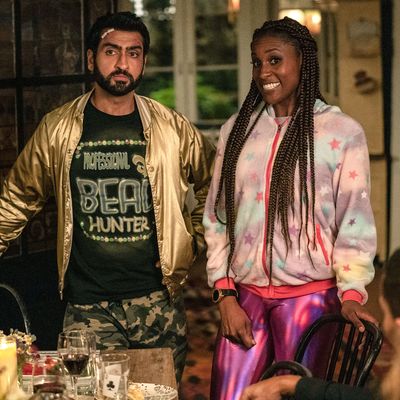
These are the hardest reviews to write. Harder than pans, which are often energized by a crackling fire of hatred. Harder than paeans, exercises that remind you of the wonder of film as a medium. It’s trying to wrangle thoughts on a film that left an impression as lasting as footsteps near the sea shore that is the most laborious. And that’s exactly what The Lovebirds, directed by Michael Showalter and written by Aaron Abrams and Brendan Gall, left me. This is a film designed to be watched while performing a menial task — folding the laundry or washing dishes. Even during a pandemic, or perhaps especially so, we have more pressing things to do with our time than drain it away watching mediocre Netflix comedies.
The Lovebirds opens on the tender beginnings of the relationship between Leilani (Issa Rae) and Jibran (Kumail Nanjiani), laying on the romance thick with sidelong glances and giggles and flirtatious rapport before jumping forward four years later to show the relationship in tatters. Leilani and Jibran are arguing about The Amazing Race, their contrasting views on their ability to compete as a couple reflective of a greater divide in their relationship: Does she really believe “marriage is bullshit” or is she too afraid to admit to the desire? Is he protective of his creative work or merely a failure content with never succeeding? “Are we done?” he asks. “I think we’ve been done for a while.” But before what seems like an inevitable breakup can sink in a cyclist crashes into the hood of their car, splintering their windshield and their lives. It gets worse from there. When a man posing as a cop they nickname Mustache (Paul Sparks) commandeers their car, chases down the cyclist, and repeatedly runs him over, the fractured couple is left to face the repercussions. Too afraid to go to the cops, Leilani and Jibran decide to solve the crime themselves in order to clear their names. Amid the hijinks and anxiety are emotionally vulnerable moments that demonstrate the love they still have for each other.
The Lovebirds has many issues that prohibit it from being a worthwhile diversion. Rae and Nanjiani don’t quite fit as the charming, clumsy couple the story requires they be. Rae has been creating a profile of work that celebrates blackness and is undergirded by humor, most notably on her HBO series Insecure; she’s a luminous comedian but ultimately an uneven actor. Nanjiani is amiable but lacks the fine-tuned physicality to sell certain gags, a criticism I’d lob against his performances in The Big Sick and Jordan Peele’s Twilight Zone, too. Together, it isn’t that they’re wholly without chemistry, but what little they do possess isn’t enough to surmount the issues in the film’s direction. Showalter’s filmmaking style and Brian Burgoyne’s cinematography renders New Orleans inert and far too clean. Has the city — so vibrant and alive — ever felt so drab and forgettable?
And the script. Here, humor often takes the form of characters anxiously speaking over one another, as if confusion is inherently hilarious. Characters deliver lines like “This is the Amazing Race with dead people” or describe the experience of eating tapas as “being mouth-fucked by the Dead Sea.” Bits are tired, like when the couple stumbles into an Eyes Wide Shut-style orgy whose absurdity fails to distract the two from fighting about their lackluster future. Neither the dialogue nor the set pieces land with the force necessary for the comedy to work — or the romance, for that matter.
Don’t the audiences of today deserve better than staunchly average streaming movies? Don’t those audiences, now more than ever, deserve a film that allows us to escape the confines of our socially distanced lives? Unfortunately, The Lovebirds isn’t that film. It’s just another in a long line of bland, forgettable, algorithmically designed movies that leaves your mind the moment after you finish it.
More From This Series
- The Thriller Drop Is a Perfect Addition to the Bad-First-Date Canon
- The Accountant 2 Can Not Be Taken Seriously
- Another Simple Favor Is So Fun, Until It Gets So Dumb


